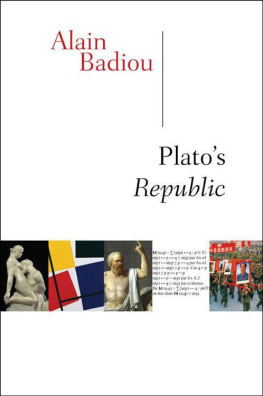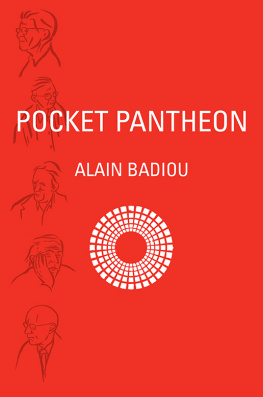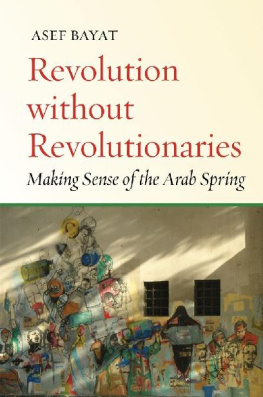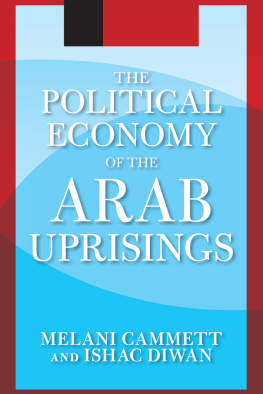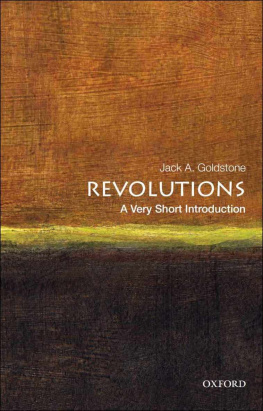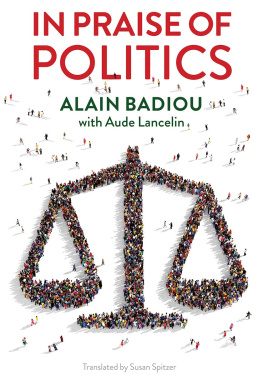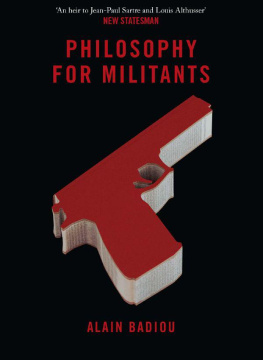
ALAIN BADIOU
THE REBIRTH OF HISTORY
Translated by Gregory Elliott

London New York

This book is supported by the Institut franais as part of the Burgess programme
www.frenchbooknews.com
First published in English by Verso 2012
Verso 2012
Translation Gregory Elliott 2012
Originally published as Le Rveil de lhistoire
Nouvelles ditions Lignes 2011
All rights reserved
The moral rights of the author have been asserted
1 3 5 7 9 10 8 6 4 2
Verso
UK: 6 Meard Street, London W1F 0EG
US: 20 Jay Street, Suite 1010, Brooklyn, NY 11201
www.versobooks.com
Verso is the imprint of New Left Books
eISBN: 978-1-84467-924-9
British Library Cataloguing in Publication Data
A catalogue record for this book is available from the British Library
Library of Congress Cataloging-in-Publication Data
A catalog record for this book is available from the Library of Congress
CONTENTS
Introduction
What is going on? Of what are we the half-fascinated, half-devastated witnesses? The continuation, at all costs, of a weary world? A salutary crisis of that world, racked by its victorious expansion? The end of that world? The advent of a different world? What is happening to us in the early years of the century something that would appear not to have any clear name in any accepted language?
Let us consult our masters: discreet bankers; media stars; hesitant representatives of major commissions; spokesmen of the international community; busy presidents; new philosophers; factory and estate owners; stock market men and boards of directors; chattering opposition politicos; urban and provincial notables; economists of growth; sociologists of citizenship; experts on all sorts of crises; prophets of the clash of civilizations; heads of the police, justice and penitentiary systems; profit assessors; productivity calculators; the prim editorialists of serious newspapers; human resources directors; people who in their own view are of some account; people one would do well not to take for nobodies. What have they got to say about it, all these rulers, all these opinion-formers, all these leaders, all these thimble-rigging tyrants?
They all say that the world is changing at a dizzying pace and that, if we are not to risk ruin or death (for them it comes to the same thing), we must adapt to this change or, in the world as it is, be but a mere shadow of ourselves. That we should energetically engage in incessant modernization, accepting the inevitable costs without a murmur. Given the harsh competitive world that daily confronts us with challenges, we must climb the steep slopes of productivity, budget reduction, technological innovation, the good health of our banks, and job flexibility. All competition is sportive in its essence. In short, we must form part of the final breakaway alongside the champions of the moment (a German ace, a Thai outsider, a British veteran, a Chinese newcomer, not to mention the ever vigorous Yankee, and so on), and never crawl at the back of the pack. To that end everyone must pedal: modernize, reform, change! What politician on the campaign trail can dispense with proposing reform, change, novelty? The argument between government and opposition always takes the following form: What the others are saying isnt real change. Its a thinly re-sprayed conservatism. I represent real change! Youve only to look at me to know it. I reform and modernize; new laws rain down every week bravo! Lets break with routine! Out with the old!
So let us change.
But change what, in fact? If change is to be permanent, its direction, so it would seem, must be constant. All the measures dictated to us by the economic situation are to be implemented as a matter of urgency. This is so that the rich can continue to get rich while paying fewer taxes; so that the workforce of firms can be reduced with numerous redundancies and extensive restructuring; so that everything which is public can be privatized, and thereby ultimately contribute not to the public good (a particularly anti-economic category), but to the wealth of the rich and the maintenance (costly, alas) of the middle classes, who form the reserve army of the rich; so that schools, hospitals, housing, transport and communications those five pillars of a satisfactory life for all can initially be regionalized (that is a step forward), then exposed to competition (that is crucial), and finally handed over to the market (that is decisive), in order that the places and resources where and with which the rich and semi-rich are educated, treated, housed and transported cannot be confused with those where the poor and their like struggle to get by; so that workers of foreign origin, who have often lived and worked here for decades, can have their rights reduced to nothing, their children targeted, their statutory papers rescinded, and have to endure the furious campaigns of civilization and our values against them; so that, in particular, young girls can only go out on the streets with their heads uncovered, and the rest too, mindful as they must be of affirming their secularity; so that the mentally ill can be imprisoned for life; so that the countless social privileges on which the lower classes are getting fat can be hunted down; so that bloody military expeditions can be mounted the world over, especially in Africa, to enforce respect for human rights i.e. the rights of the powerful to carve up states, to put in power (through a combination of violent occupation and phantom elections) corrupt valets, who will hand over the totality of the countrys resources to the aforesaid powerful for nothing. Those who, for whatever reason, and even if they were serviceable for modernization in the past, even if they were obliging valets, are suddenly opposed to the carve-up of their country, to its pillaging by the powerful and the human rights that go with it, will be brought before the tribunals of modernization, and hanged if possible.
Such is the invariant truth of change, the actuality of reform, the concrete dimension of modernization. Such, for our masters, is the law of the world.
This short book aims to oppose to this view of things a rather different one, which can be summarized here in three points.
1. Under the interchangeable rubrics of modernization, reform, democracy, the West, the international community, human rights, secularism, globalization and various others, we find nothing but an historical attempt at an unprecedented regression, intent upon creating a situation in which the development of globalized capitalism, and the action of its political servants, conforms to the norms of their birth: a dyed-in-the-wool liberalism of mid-nineteenth-century vintage, the unlimited power of a financial and imperial oligarchy, and a window-dressing of parliamentary government composed (as Marx put it) of Capitals executives. To that end, everything which the existence of the organized forms of the workers movement, communism and genuine socialism had invented between 1860 and 1980, and imposed on a world scale, thereby putting liberal capitalism on the defensive, must be ruthlessly destroyed, and the value system of imperialism the celebrated values recreated. Such is the sole content of the modernization underway.
2. The present moment is in fact that of the first stirrings of a global popular uprising against this regression. As yet blind, naive, scattered and lacking a powerful concept or durable organization, it naturally resembles the first working-class insurrections of the nineteenth century. I therefore propose to say that we find ourselves in a time of riots wherein a rebirth of History, as opposed to the pure and simple repetition of the worst, is signalled and takes shape. Our masters know this better than us: they are secretly trembling and building up their weaponry, in the form both of their judicial arsenal and the armed taskforces charged with planetary order. There is an urgent need to reconstruct or create our own.
Next page



